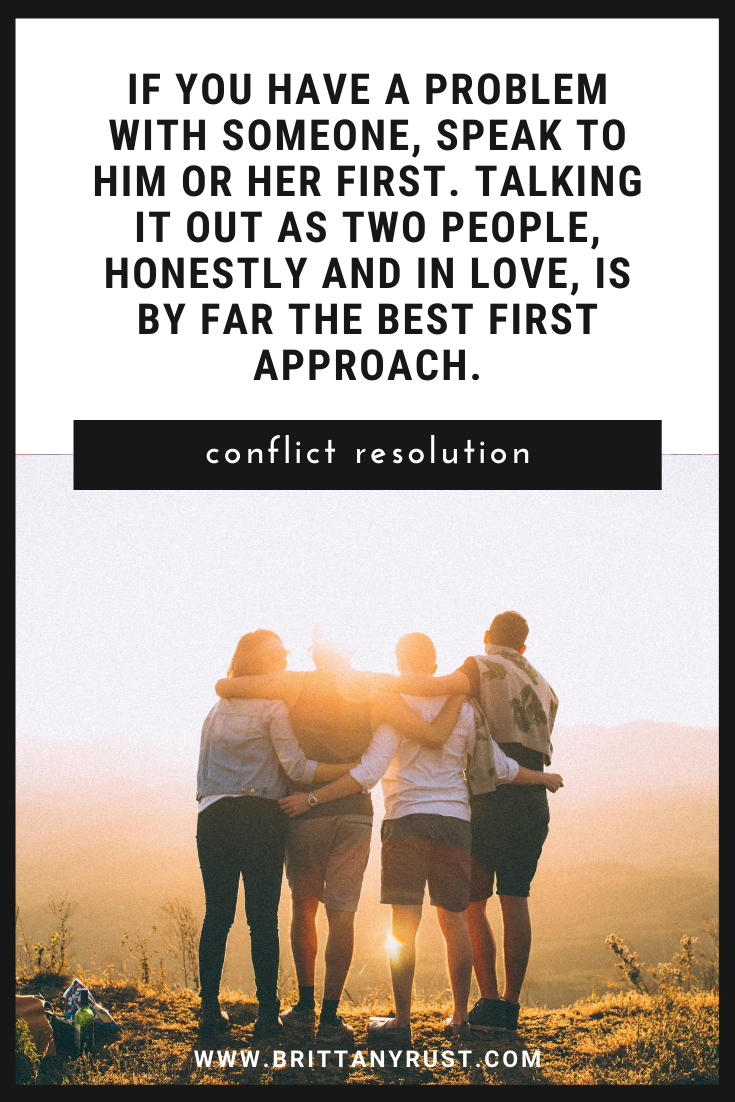What Does the Bible Say About Conflict Resolution?
Conflict in the Body
Conflict can be good when dealt with in a healthy way. And there is a healthy way. A problem I have seen in the Church and in many of the organizations I’ve worked with is that people avoid it and adopt a more passive-aggressive approach. Which is far worse than conflict. A passive-aggressive attitude circumvents resolution and healthy relationships. It’s a disease within a team.
But again, conflict resolution must be done right. Be careful not to vent your frustrations to someone else. Or tell a boss about it in your passive-aggressive fear.
You may feel you have the purest motives in telling an outside party, but that is not biblical and it is wrong. Matthew 18 tells you to go to that person if there is a fault; not a boss, not a pastor, not anyone. Period. Bringing another into the situation takes place only when you have approached the person without resolution. You may then move to step two of the process, which is including someone else in the discussion who might help the individual turn from sin.
Would you want someone going to others and saying negative things about you? Would you want your name and character smeared? Of course not. So never do it to someone else. Always follow Jesus' words in Matthew 18 in a conflict.
The Biblical Model for Conflict Resolution
Jesus' words in Matthew 18:15–17 give us a clear path for dealing with a friend or family member who is sinning against us.
“If your brother sins against you, go and tell him his fault, between you and him alone. If he listens to you, you have gained your brother. But if he does not listen, take one or two others along with you, that every charge may be established by the evidence of two or three witnesses. If he refuses to listen to them, tell it to the church. And if he refuses to listen even to the church, let him be to you as a Gentile and a tax collector.”
There are four steps outlined in this passage that tells us how to deal with a matter of sin.
1. Go to the person one on one.
If you see sin in a friend's or family member's life, go to that one. If you have a problem with someone, speak to him or her first. Talking it out as two people, honestly and in love, is by far the best first approach. You never know; you could be perceiving the situation wrong or your friend might repent without having to take the matter any further.
2. Bring another along.
If going to the person alone does not work to bring repentance or reconciliation, it is time to bring another into the mix who can act as a further witness to the need for correction. But this is important: Make sure it is a godly person who can be trusted, someone who knows both you and the person being approached. That witness can confirm what is going on and help the person being confronted to comprehend the sin or the wrong being done.
3. Tell it to the church.
If neither the first nor second approach works, it is time to bring it to the church. Note, the assumption is that the church is a loving fellowship that will not bring a charge with impure motives.
4. Separation.
If nothing works to bring repentance from the sinner, ties must be cut. This is not meant to be an unloving act but, rather, a separation from sin. You can still extend grace and love to the person, but the fact is, if at this point the person's heart has not been softened, chances are it might never be. Better to create distance so that the sin is not like yeast that spreads throughout the Body.
If you see sin in another's life or if you are upset with someone who has hurt you, Matthew 18 the solution. It is the process God has established, and you are not above it, no matter how right or justified you might feel to go another route. One of the quickest ways of causing division in the Body of Christ is by circumventing healthy conflict. I cannot tell you how many times I have watched someone discuss with one person the problem he or she has with another person instead of talking to the offending person directly.
I hope this helps bring some clarity to this process. I pray you don’t experience any conflict, however, even within the Body it’s inevitable. So, if you do, take this approach to heart and be an example of healthy conflict resolution.
I end with this: If you’ve been hurt because someone didn’t follow these biblical responses, I am so sorry for your pain. I have also been on the end of poor leadership or a friend who spoke behind my back or hurt me. It’s not easy but there is healing for those hurts and you can start again.


